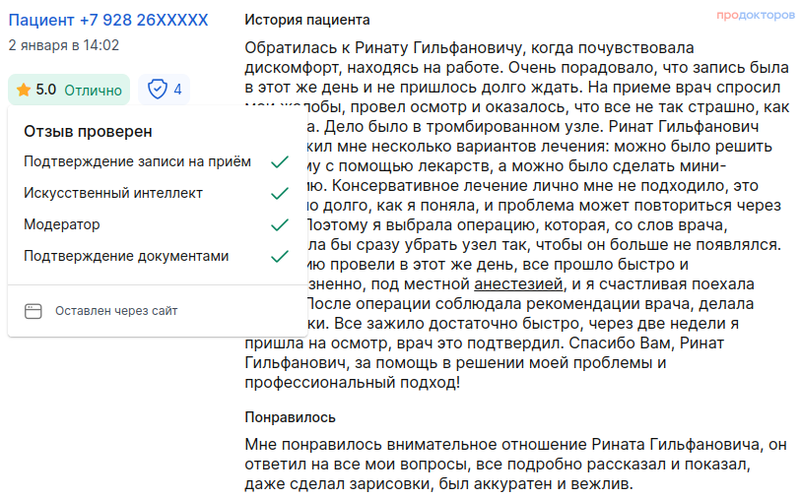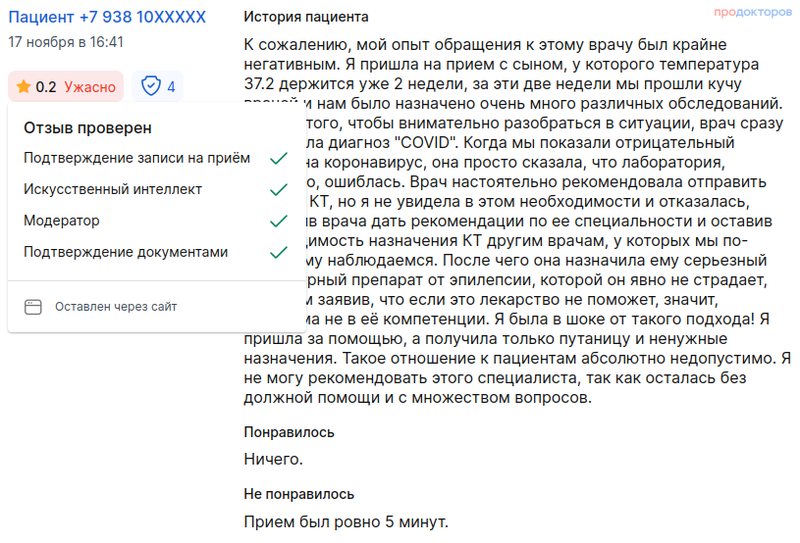Why do we check reviews? 
We really want to make medicine patient-centered. We want the patient to become a full participant in the process, to understand what is happening to him, why he needs to undergo procedures or take medications prescribed by the doctor, how they will affect his body, so that he can get enough information and be responsible for the process of his treatment.
The very first stage, the selection of a specialist, plays an important role. Something different is important for each of us. For example, it is important for one person that everything be done quickly and strictly to the point, for the other — that everything be explained to him, listened to and showed maximum attention. And knowing that the doctor is rude, but makes the right diagnosis and treats effectively, the patient will not be disappointed by the discrepancy between expectations and reality. Accordingly, it is more likely that the patient will hear the doctor and listen to him, rather than leave the office with the idea that this is not what he expected, and another specialist should be sought. And reviews, that is, the experience gained by other patients, helps not only in choosing a doctor, but also in forming primary opinions and expectations.
In addition to the fact that we value the trust of our users and want them to receive only reliable information, there is another important point: ProDoctorov– this is a licensed media outlet and, accordingly, subject to the Law of the Russian Federation dated December 27, 1991 N 2124-1«О СМИ». Accordingly, employees should check the data that they publish.
In addition to the desire for the published information to be reliable, it is important for us that it is also useful. That is, it should be clear from the text of the review who wrote it (the author himself or his close friend) and on the basis of which this opinion was formed (simplified, the text of the review should contain an answer to the question of how this doctor helped / did not help). Information about who the patient is affects the degree of trust in him, and information about personal experience helps to understand which diseases the doctor is most competent in, as well as to form primary expectations from receiving and communicating with this specialist.
How we check reviews 
- The first stage is text verification using Artificial Intelligence (AI). Even at the moment of leaving a review, he analyzes the text and gives a hint if it lacks a personal story (it is not clear what happened at the reception and why the author has such an opinion).
Tip: add information about the appointment itself, how it went, whether treatment was prescribed, how the doctor communicated with the patient, etc. Even in general terms, this information will be useful if it relates specifically to your experience. We recommend using more personalized phrases instead of general phrases («врач хорошо общается с пациентами»«врач назначает верное лечение», «врач со мной хорошо общался»«врач назначил моей маме верное лечение»).
2. The second stage is to check a number of parameters in automatic mode, for example, the uniqueness of the text, the presence of matches with other reviews.
Tip: do not copy other people's reviews or wishes / words of gratitude: even if you want to write «покрасивее». Your sincere words are better than the boilerplate phrases found in hundreds on the Internet.
3. The third stage is moderation, that is, an employee checks the text and the author's profile for compliance with the publication policy and the rules of the resource. In other words, the moderator checks whether the review is unique, whether it is clear who wrote it and what exactly happened at the reception, whether there are inconsistencies in the author's profile and whether there are problems in the profile of the doctor or clinic (for example, there were cases of providing fake / other people's documents or attempts to leave one review from different numbers).
Full information about moderation and its rules is private information, but a general idea can be obtained from the information «Политики публикации материалов»posted at the bottom of any pageProDoctorov.
Moderation can be primary (when adding a review) and repeated (with further user actions on the portal and actions of other users on the same page), which allows you to separate those reviews that may turn out to be unreliable for one reason or another.
This does not mean that the rejected review will never be published: the author can find out about the reason for the rejection in his personal account (either from a notification from a medical professional, which can be received in one of the following ways: by email, in a push notification or in the form of an SMS) and make corrections there or contact the department responsible for verification. reviews, and learn about the reasons for the rejection and what he can do to ensure that the review is posted. In some cases (for example, if there is a lack of personal history in the text), a call and a small addition may be enough for the review to appear on the page.
Contacts of the review review department:
proverka@medrocket.ru
8 800 600-30-28
Write to WhatsApp
Write to Telegram
4. The fourth stage is an extended verification or verification with a request for supporting documents. So far, not all reviews have passed it. The reason for the transfer to this stage may be, for example, a number of coincidences with reviews that were previously identified as unreliable, or information that potentially discredits the honor, dignity and business reputation of a doctor or clinic.
Thus, both negative, positive, and neutral reviews can be checked.
As for the positive ones: both clinics and doctors are tempted to create a reputation on the Internet through fake reviews. For example, written by colleagues, family members, or even custom-made for money. Fortunately, most of the medical institutions and specialists posted on the portal act honestly and avoid such methods. But, alas, there are exceptions. Therefore, even the most enthusiastic review can be checked with a request for documents confirming the appointment with a doctor. In addition, pages where fraud attempts have been noticed come under closer control: reviews on these pages are more often checked with a request for documents.
In the case of negative reviews, in addition to the fact that the review may turn out to be anti-publicity, it also happens that the situation turns into a legal field: the doctor or clinic sues the author and demands the removal of the review and compensation for damage to their business reputation. By publishing a patient's opinion, which includes information about violations of the Law, harm to health, or non-compliance with certain norms, we want to have guarantees that this information is reliable. In addition, in the case of such legal claims, our legal department is ready to act on the patient's side free of charge and help him defend his opinion and the right to it. This is called a Review Author Protection Program. In this case, the author may refuse to participate in it. He can inform the portal employee about this, who conducts the review at the fourth stage of verification (both through a call and during correspondence by mail / messenger / in a medical card).
Extended review checks can be performed in three more cases:
- At the request of a doctor or a representative of the clinic (this is due to Article 43 of the Law on Mass Media, that is, the right to refute false and defamatory information and business reputation).
- By decision of the portal Administration.
- at the request of the author (in case the review was rejected as suspicious at the moderation stage, but the author contacted the verification department on his own and provided the documents).
Regardless of who initiated the review, its purpose is to verify the authenticity of the review. That is, that the facts described by the patient in the review actually existed and he can provide documentary evidence of them. We are not talking about such documents of a person as a passport, SNILS or medical policy.
The review can be confirmed by an act from the clinic (with the name of the doctor or the name of the service), an extract, a study protocol, an epicrisis after surgery, a prescription, or other document that the patient can receive during treatment or request after it ends.
Important! An extended check is a journalistic investigation, not an expert examination. We do not evaluate the quality of care received by the patient and do not make conclusions about who is right or wrong in the current situation.
Why are we asking for confirmation of the review from the patient? 
ProDoctorov It is not a medical or supervisory organization and cannot receive documents from anyone other than the patient himself or his legal representative, since in our country there is a law on the observance of medical secrecy, which states that neither the doctor nor the clinic have the right to disclose information about the patient's health to third parties.
Unfortunately, not all patients are ready to send photos or scans of documents to the portal. One of the common reasons is concern that the data may be accessed by outsiders or published. Therefore, it is important to note: firstly, we never publish any photographs of documents provided to us by patients without their permission. And secondly, in the vast majority of cases, before sending a photo, the patient can independently close his full name, date of birth, address or other personal data on the document, allowing to reveal his identity. Otherwise, our employee will close them after receiving them.
Without the assistance and cooperation of the author, we cannot confirm the authenticity of the review and guarantee to our users that the described experience is true and can be used when making a choice. In cases where the authenticity has not been proven, we are forced to either stop publishing or reject reviews if the review was carried out before the review was posted on the page.
How does the review status affect the appearance of the review
The review is in the process of extended verification.

Positive feedback, confirmed during the extended verification process.

A negative review that was confirmed during the extended review process.

A cancelled review that was not confirmed during the extended review process.










